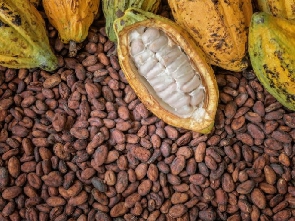 Some agro-chemical sellers have been accused of selling unapproved chemicals to cocoa farmers
Some agro-chemical sellers have been accused of selling unapproved chemicals to cocoa farmers
Some cocoa farmers of the Anyinabirim community in the Sefwi Wiawso Municipality, Western Region, have appealed to the Ghana Cocoa Board (COCOBOD) to check the activities of agro-chemical producers if it is to realise its target set for the cocoa season.
COCOBOD is hoping to achieve 900,000 metric tonnes of cocoa for the 2018/19 cocoa season. For this reason, it has introduced a number of cocoa productivity enhancement programmes, including the supply of agro-chemicals, subsidised fertilizers, hand-pollination exercises, and pruning among others.
However, according to the concerned cocoa farmers, given the ‘inadequate’ supply of chemicals, some agro-chemical producers have taken advantage of the situation by selling unapproved chemicals to the unsuspecting cocoa farmer.
This development, the cocoa farmers noted, could derail government’s effort to ensure that farmers record an increase in their yields.
During a ‘Q & A’ session at the 2nd Cocoa Dialogue Series, organised by the Ghana Agricultural and Rural Development Journalists Association (GARDJA) with support from UTZ, at Anyinabirim, the cocoa farmers observed that the influx of ‘fake’ chemicals is partly due to the weak monitoring of licenced and unlicenced agro-chemical sellers.
In addition to this, they also raised a number of challenges confronting the cocoa farming business.
But the Acting Deputy-Director, Cocoa Health and Extension Division, COCOBOD, Dr. Nii Tackie-Otoo, who was guest-speaker for the ceremony, took time to address all concerns raised by the cocoa farmers.

Ag. Deputy Director, Cocoa Health and Extension Division, Dr. Nii Tackie-Otoo, addressing participants at the GARDJA 2nd Cocoa Dialogue
Speaking in an interview with B&FT, he acknowledged that COCOBOD has taken notice of this development and will have to collaborate with other stakeholders like the Plant Protection and Regulatory Services Directorate (PPRSD) of the Ministry of Agriculture, Food and Drugs Authority (FDA) and the Environmental Protection Agency (EPA) to arrest the situation.
He explained that the likely action will be to commission a taskforce to monitor the markets and arrest those behind this act for prosecution.
He is optimistic that this will deter people from engaging in this act, while also educating cocoa farmers on the dangers associated with using unapproved chemicals.
Dr. Tackie-Otoo also indicated that as part of the interventions being pursued to deepen productivity while also addressing some of the challenges of cocoa farming, COCOBOD is exploring the idea of expanding the number of persons used for the hand-pollination programme to 30,000.
He further disclosed that while analysis of the 2017/18 pod count is still in progress, selection of new pollination centres is ongoing for the exercise which will be carried out in phases next year.
“COCOBOD is procuring 20,000 additional mist-blowers and knapsack sprayers. The Board will ensure timely supply of chemicals to farmers,” he stated.
He also hinted that the number of spraying gangs will be increased to ensure that all cocoa farms are covered.
Dr. Tackie-Otoo observed that “enormous opportunities also exist for private-sector participation in our CODAPEC and Hi-Tech programmes”.
He emphasised that COCOBOD will ensure equal allocation of pesticides for both Blackpod and Capsid control, as well as strengthening and resourcing Regional Task Forces to supervise field operations.
Among other things, he suggested that the security agents must be involved at all levels of the distribution exercise to prevent pilfering and smuggling.
Additionally, he proposed that the distribution of inputs through recognised farmers’ associations should be reviewed and reintroduced.
The President of GARDJA, Mr. Richmond Frimpong, addressing stakeholders at the ceremony also appealed for traditional authorities to grant the youth access to farmlands in order to address the issue of ageing cocoa farmers.
He said with the youth’s involvement in cocoa production,n Ghana’s economy will always have its share of cocoa’s contribution to local development.